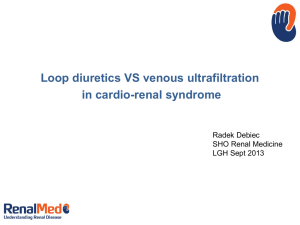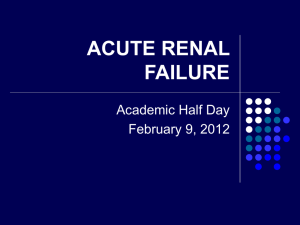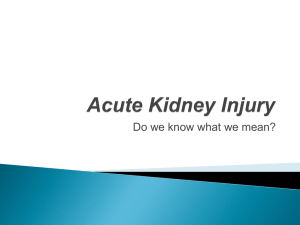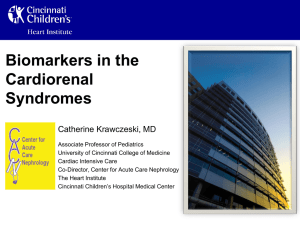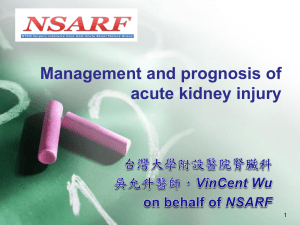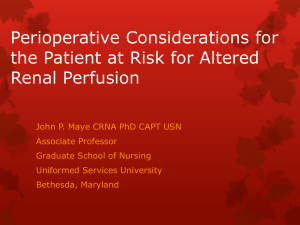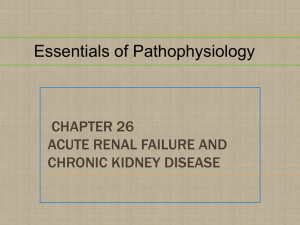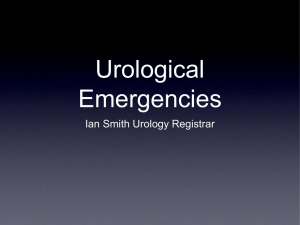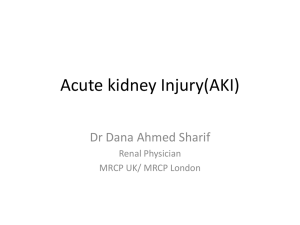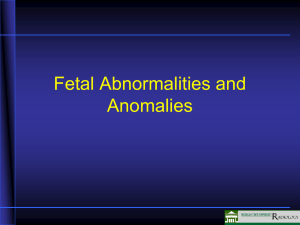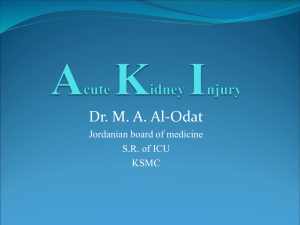Pathophysiology of acute decompensated heart failure.
advertisement
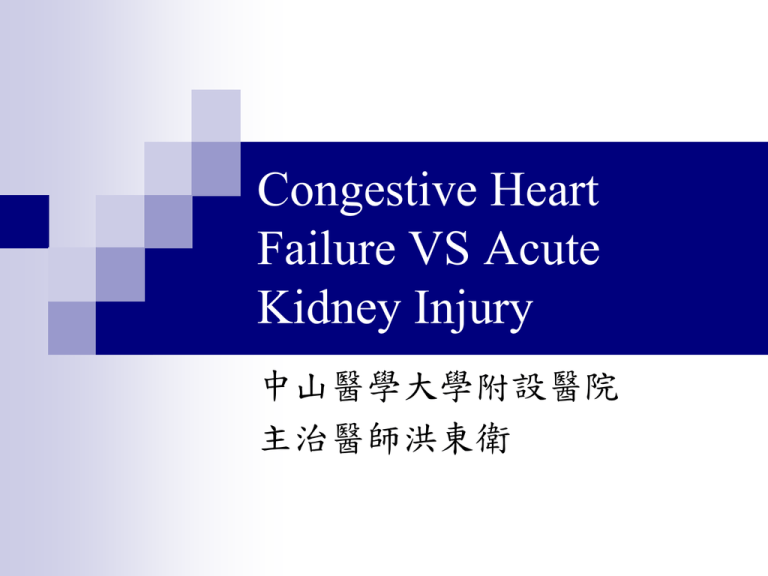
Congestive Heart Failure VS Acute Kidney Injury 中山醫學大學附設醫院 主治醫師洪東衛 Outline Definition of Congestive heart failure and acute kidney injury Epidemiology of AKI in heart failure Pathogenesis of AKI in heart failure Biomarker of AKI and CHF Treatment Definition of heart failure failure of pumping CO to peripheral tissues and stasis of blood, fatigue, edema and pulmonary congestion complex mechanical and neurohumoral syndrome characterized by effort intolerance, fluid retention Acute kidney injury AKI can result from decreased renal blood flow, a toxic insult to the renal tubule, tubulointerstitial inflammation or a primary reduction in GFR Criteria of acute kidney injury Nephron Clin Pract 2009, 112, c222-229 Causes of Acute Kidney Injury AKI effect on heart Fluid overload pulmonary edema. Hyperkalemia arrhythmias and cardiac arrest. Untreated uremia affects myocardial contractility. Acidemia pulmonary vasoconstriction , rightsided HF, negative inotropic effect and might arrhythmias Renal ischemia activation of inflammation and apoptosis at cardiac level Cardiorenal syndrome (CRS) Definitions.. Disorders of the heart and kidneys whereby acute or chronic dysfunction in one organ may induce acute or chronic dysfunction of the other Nephrol Dial Transplant 2011; 26: 62–74 Cardiorenal syndrome classification Cardiorenal Syndrome (CRS) General Definition: A pathophysiologic disorder of the heart and kidneys whereby acute or chronic dysfunction in one organ may induce acute or chronic dysfunction in the other organ CRS Type I (Acute Cardiorenal Syndrome) Abrupt worsening of cardiac function (e.g. acute cardiogenic shock or acutely decompensated congestive heart failure) leading to acute kidney injury CRS Type II (Chronic Cardiorenal Syndrome) Chronic abnormalities in cardiac function (e.g. chronic congestive heart failure) causing progressive and potentially permanent chronic kidney disease CRS Type III (Acute Renocardiac Syndrome) Abrupt worsening of renal function (e.g. acute kidney ischaemia or glomerulonephritis) causing acute cardiac disorder (e.g. heart failure, arrhythmia, ischemia) CRS Type IV (Chronic Renocardiac Syndrome) Chronic kidney disease (e.g. chronic glomerular or interstitial disease) contributing to decreased cardiac function, cardiac hypertrophy and/or increased risk of adverse cardiovascular events CRS Type V (Secondary Cardiorenal Syndrome) Systemic condition (e.g. diabetes mellitus, sepsis) causing both cardiac and renal dysfunction Epidemiology up to 45% of patients hospitalized with decompensated HF developing worsening renal function (WRF) (Kimmenade et al, 2007) an independent poor prognostic marker WRF and ADHF poor clinical outcomes in patients who develop AKI when hospitalized for decompensated heart failure (Cowie et al, 2004) small increases in SCr (50% increase or absolute increase of 0.3 mg/dL from baseline as in stage I AKI), independently associated with both short-term and long-term outcomes small changes in SCr are transient and renal function ‘‘improves,’’prognosis remains worse Gottlieb et al., 2002 POSH trial (Prospective outcomes study in heart failure) 299 patients aged >20 years, across eight European countries admitted to hospital with decompensated heart 33% developed AKI (described as ‘worsening renal function’), defined by an increase in SCr. > 0.3 mg/dl from baseline during their hospital admission with a mean time of of 4 days ADHERE registry more than 100 000 patients, heart failure, included elderly patients and CKD Impaired eGFR was a strong predictor of mortality, more than ejection fraction in decompensated heart failure Even a moderate rise in creatinine (>0.3 mg/dl) in hospitalized patients predicted an increased risk of death and prolonged hospitalization pre-existing chronic kidney disease is also a predictor of worse outcome and mortality renal impairment and acute kidney injury in heart failure are strong and independent predictors of poor outcome and prognosis. Even a relatively small decline in renal function Risk factors for development of cardiorenal syndrome Advanced age, diabetes, pulmonary edema on chest X-ray on admission (Cowie et al, 2004) co-morbid vascular disease, higher level of baseline urea (Heywood, 2004) HTN and lower SBP on admission (SOLVD Investigators, 1991) EF with studies such as SOLVD suggesting a link between poor EF and increased risk of AKI in decompensated cardiac failure, while others have shown no association (Geisberg and Butler, 2006) Pathophysiology Cardio-Renal Axis: any increase in atrial pressure diminishes the arginine vasopressin release (AVP) through the Henry-Gauer Reflex, decreases renal sympathetic tone, and increases the atrial natriuretic peptide, increase the urinary sodium and water excretion rate Pathophysiology of acute decompensated heart failure. [Reproduced with permission from Schrier RW. Body fluid volume regulation in health and disease: A unifying hypothesis. Sarraf M et al. CJASN 2009;4:2013-2026 ©2009 by American Society of Nephrology Role of decreased baroreceptor sensitivity, and activation of RAAS and SNS in expansion of water and sodium retention as well as worsening HF. [Reprinted from J Am Coll Cardiol, vol. 47, Schrier RW, Role of diminished renal function in cardiovascular mortal... Sarraf M et al. CJASN 2009;4:2013-2026 ©2009 by American Society of Nephrology Vasopressin stimulation of V2 and V1a receptors can contribute to events that worsen cardiac function. [Reprinted from J Am Coll Cardiol, vol. 47, Schrier RW, Role of diminished renal function in cardiovascular mortality: Marker or pathogenetic factor? pp. ... Sarraf M et al. CJASN 2009;4:2013-2026 ©2009 by American Society of Nephrology Pathophysiological mechanisms Haemodynamic Neurohormonal activation of RAAS, SNS, AVP Inflammatory immune activation Haemodynamic CRS were more likely to be clinically fluid overloaded than deplete on admission to hospital While Forman et al (2004) venous congestion, increase in right atrial pressure was a significant independent predictor for the development of renal dysfunction in decompensated heart failure Haemodynamic renal perfusion : pressure gradient across the kidney, reduced not only when a reduction in mean arterial pressure but also when renal venous pressure is elevated (congestion and elevated right atrial pressure) Activation of renin–angiotensin–aldosterone system secondary to low renal perfusion pressure or blood flow (Bongartz et al, 2005) sodium and water retention as a result of the actions of angiotensin II and aldosterone. prolonged activation leads to both worsening renal function, with a reduction in renal blood flow and eGFR (Bongartz et al, 2005), worsening cardiac function with increased myocardial oxygen demand, myocardial ischaemia, impaired contractility and arrhythmogenesis. Pathophysiology of the relation between venous congestion and reduced glomerular filtration rate (GFR). Damman K et al. Eur J Heart Fail 2007;9:872-878 © 2007 European Society of Cardiology Inflammatory immune activation CHF and advanced CKD : neurohormonal and inflammatory immune activation CHF inflammatory cytokines :TNF and IL-6 independent predictors of adverse outcome, progression (Anker et al, 2002) in decompensated HF gut wall edema (secondary to elevated RA pressure) facilitates translocation of bacterial endotoxin (lipopolysaccharide) (Niebauer et al, 1999). The net result of inflammatory cytokine activation, adversely impact on cardiac and renal function. Biomarker in kidney and heart disease AKI: Pathophysiology and markers Heart Fail Rev (2011) 16:503–508 BNP and NT-proBNP Mean BNP as it relates to GFR. Nephrol Dial Transplant 2011; 26: 62–74 With a cut-point set at 300 pg/mL for excluding acute HF, a negative predictive value of 94 and 100% for patients with a GFR < and ≥ 60 mL/min/1.73 m2, respectively Nephrol Dial Transplant 2011; 26: 62–74 Treatment options Most heart failure trials excluded patients with marked renal impairment, resulting in a lack of evidence to guide best practice in the management of patients with renal impairment and heart failure. British Journal of Hospital Medicine, May 2010, Vol 71, No 5 Diuretics the mainstay of treatment in decompensated HF. higher doses of diuretics were independently associated with increased risk of death, sicker patients receive the highest doses of diuretic (Geisberg and Butler, 2006) A number of studies shown aggressive diuresis to be associated with worsening renal function (Shlipak and Massie, 2004) more effective when slow continuous infusions than in bolus ( Geisberg and Butler, 2006) gradual diuresis, allowing time for fluid to move from the extravascular to intravascular space and avoid significant drops in renal perfusion co-administer a thiazide diuretic, provide synergistic benefit, sodium reabsorption is inhibited at multiple sites within the nephron (i.e. loop of Henle and distal tubule) Angiotensin-converting enzyme inhibitors and/or angiotensin receptor blockers ACEI has a survival benefit in patients with heart failure (SOLVD Investigators, 1991; Cowie et al, 2004). Cr. levels often rise after the initiation of ACEI in decompensated heart failure, especially with preexisting renal impairment (Shlipak and Massie, 2004) patients with renal impairment may derive greater benefit from ACEI a moderate deterioration of renal function, allowing up to 20% increase in creatinine, should be tolerated. CONSENSUS Study Group more likely to have a Cr. rise if they had pre-existing renal impairment or severe HF Most patients had a 10–15% increase in Cr. within 3 weeks of starting enalapril, irrespective of their baseline Cr., then tended to settle at this or an improved level over the subsequent months intravascular volume optimized, nephrotoxic drugs, NSAID should be avoided. Initiation of ACEI in declining renal function and decompensated heart failure is not recommended ACEI/ARB should be maintained wherever possible, provided renal function does not steadily decline or severe hyperkalaemia (K>6.0 mmol/litre) very low BP may require temporary reduction in beta-blockers or ACEI/ARB (other anti-HTN agents, CCB should be stopped first) during major exacerbations, with the aim of increasing MAP and renal perfusion Once stabilized these should be reintroduced or uptitrated. Other treatments beta-blocker : improved the prognosis for CHF, not be started in acute decompensated heart failure. Spirinolactone Spirinolactone is of prognostic and symptomatic benefit in advanced heart failure (Pitt et al, 1999) hyperkalaemia in AKI and pre-existing CKD, especially in conjunction with ACEI/ARB. stopped in severe hyperkalaemia (K >6.0 mmol/liter), other diuretic therapy and appropriate dietary modifications ADHERE registry 5% of patients with decompensated HF had severe hyponatraemia with sodium <130 mmol/litre (a larger number had milder degrees of hyponatraemia) EVEREST study 4133 patients with decompensated HF were randomized to conventional therapy and tolvaptan (vasopressin antagonist) or placebo no difference in mortality at 60 days, but tolvaptan was associated with improved weight loss and patient symptoms (Gheorghiade et al, 2005; Cavalcante et al, 2008). Novel therapies Arginine vasopressin secretion from the pituitary gland increased by low BP in HF, aquaporin 2 activity in the collecting duct of the kidney, water permeability, decreased diuresis; free water retention and hyponatraemia. (Kalra et al, 2001). Blocking the vasopressin receptor, increased free-water diuresis and improving congestion and hyponatraemia (Geisberg and Butler, 2006) Adenosine receptor antagonists high plasma adenosine levels in CHF lower renal cortical blood flow, restricting the diuretic response to traditional diuretic agents Blocking the adenosine receptor improves diuresis without adversely affecting the eGFR (Cotter et al, 2008). The results of large scale outcome studies are awaited. Haemofiltration alternative to diuretic therapy has many theoretical advantages in patients with severe decompensated HF removal of isotonic fluid directly from the intravascular space and also cytokines Small scale clinical studies have not demonstrated consistent improvement in outcomes or renal function (Francis, 2006) Costanzo et al (2007) comparing ultrafiltration and standard intravenous diuretic therapy for hypervolaemic heart failure patients no significant difference in dyspnoea scores, serum creatinine levels or death Take home message Traditionally AKI attributed to poor CO pre-renal failure, accumulating evidence showed mechanisms are much more complex. a poor prognostic indicator associated with increased mortality and longer hospital stay. maintained, albeit with greater care, monitoring and appropriate dose alterations New therapeutic options provide a brighter future for this high-risk group of patients 謝謝聆聽 ~
